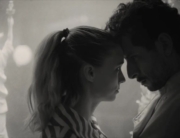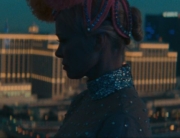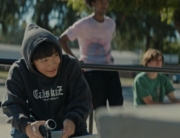Vincent Grashaw’s debut feature, Coldwater, is the kind of slow-burn thriller that almost fully peters out before any effectual action is dispensed. Dragging along with flashbacks and tight-lipped monologues, the film lacks the dexterity to grasp viewers in suspense.
P. J. Boudousqué plays Brad Lunders, a teenage drug dealer who, with his mother’s consent, is abducted in the middle of the night and sent to a wilderness facility that specializes in reforming juvenile youths. The for-profit boot camp, run by gruff, retired war Colonel Frank Reichert (James C. Burns), is located in the isolated central California backcountry, 25 miles from the nearest town.
Upon arrival, Brad and his fellow Abercrombie delinquents are summoned to a verbal smack down by the colonel. The hoodlums are commanded to run uphill to a mailbox at the outskirts of the facility’s grounds, belaboring the fact that the only barrier between them and freedom is an eight-foot chain-linked fence. And then, for a while, not much else happens.
The flashbacks pinpoint the genesis of Brad’s unruly behavior—an upper middle-class neighborhood, a patient stepfather, a spunky Hispanic cohort, a supportive girlfriend—wait, why is this kid so angry again? We also learn of an easily avoided tragedy that acts as both the tipping point in Brad’s criminality as well as the motive for his seeking redemption and release from the Coldwater facility. But really, the stakes that are raised aren’t given much weight and seem more like an afterthought.
Coldwater heightens its pace with the arrival of Brad’s aforementioned childhood buddy, Gabriel (Chris Petrovski). At each other’s throats one minute and hugging it out the next, the two punks share a brotherly bond that amplifies their resolve to escape. Their youthful connection—and the agonizing treatment imposed upon them by the boot camp’s squadron of Coldwater-reformed counselors—leads to a climactic third act that, though rather precipitous, is still grasping in its execution. However, the conclusion succeeded in raising my pulse and inducing some palm-sweating trepidation. For some viewers, that may be enough for Coldwater to redeem itself.
Grashaw aims high with his debut, and the film’s content is certainly worth exploring. The director, who wrote the first draft of the script after graduating from high school in 1999, decided to follow through with the production of Coldwater after running into a childhood friend who had been sent to a privatized reform facility, much like the boot camp depicted in the film. His friend’s distressing stories about the ill-treatment of teens by the counselors and the camp commander renewed Grashaw’s interest in the topic, and his efforts to bring these issues to light are laudable.
Unfortunately, Grashaw’s fledgling directing (and writing) skills are on full display here, particularly when he incorporates hackneyed lines like, “You need to get to steppin’, yo!” and, upon Brad’s arrival at the boot camp, “Welcome to paradise, boys.” Story arcs and character developments seemingly manifest out of nowhere. Abruptly, one character becomes a sloshing alcoholic, a trait that is all but forgotten for the remainder of the film. If Grashaw learns to pick up the pace—and drop the clichés—in his future endeavors, he may possess the spunk to make a truly tortuous, slow-gestating thriller, one whose pay-off is worth the buildup.







Leave A Comment